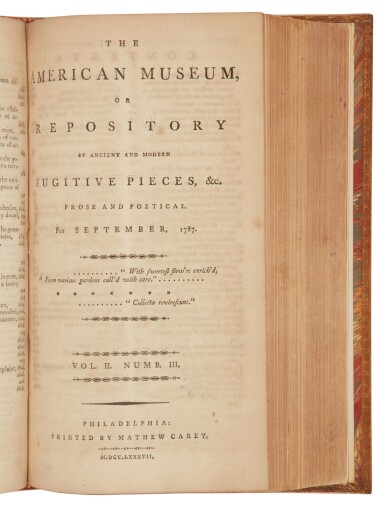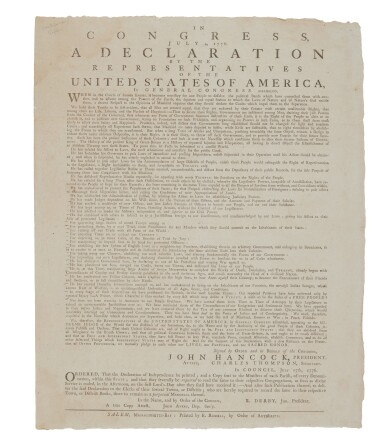The first dated printing of the Star-Spangled Banner [Francis Scott Key], 20 September 1814 STAR-SPANGLED BANNER – [KEY, Francis Scott (1779-1843)] "Defence of Fort M'Henry," as printed in the Baltimore Patriot and Evening Advertiser, Vol IV, No. 59, 20 September 1814. The rare, first newspaper printing of "The Star-Spangled Banner” appearing three days after Francis Scott Key completed the lyrics. The first to appear at auction, and one of only three copies confirmed extant. At the head of the second page, filled with breathless reports of the British failure to capture Fort McHenry, the editors of the Baltimore Patriot featured the text of Key's original four verses celebrating the occasion. Using the original title, "The Defence of Fort M'Henry,” the editors predicted (quite accurately) that this "beautiful and animating" song was "destined long to outlast the occasion, and outlive the impulse, which produced it…" The Patriot had ceased publication on 10 September so that its staff could man the city's defenses, resuming publication ten days later once the emergency had passed: "In our first renewal of publication, we rejoice in an opportunity to enliven the sketch of an exploit so illustrious, with strains, which so fully celebrate it." As a further introduction, the editors included a short synopsis of what was known of the circumstances surrounding the song's composition: "The annexed song was composed under the following circumstances – A gentleman had left Baltimore, in a flag of Truce for the purpose of getting released from a British fleet a friend of his, who had been captured at Marlborough. He went as far as the mouth of the Patuxent and was not permitted to return lest the intended attack on Baltimore should be disclosed. He was therefore brought up the bay to the mouth of the Patapsco, where the flag vessel was kept under the guns of a frigate, and he was compelled to witness the bombardment of Fort McHenry, which the Admiral had boasted that he would carry in a few hours, and that the city must fall. He watched the flag at the Fort through the whole day with an anxiety that can be better felt than described, until the night prevented him from seeing it. In the night he watched the Bomb-Shells, at an early dawn his eye was again greeted by the proudly-waving flag of his country." Key's four verses, set to the tune of "Anacreon in Heaven," a popular English drinking song, appear below the introduction. The chronology of the U.S. national anthem’s composition and earliest printings is well documented. It was written at a low point in the War of 1812, weeks after the British had captured Washington and burned nearly all its public buildings to the ground, turning next to attack Baltimore, a hotbed of American pro-war sentiment. Key, who had been a captive of the British fleet near the entrance to Baltimore Harbor since 7 September, spent the night of 13th and 14th observing the battle together with two other American detainees, including a government agent for prisoner exchange named John Stuart Skinner. In the immediate aftermath, exultant at the British failure to subdue Fort McHenry and capture the city, Key began his rough draft of what would become “The Star-Spangled Banner.” Over the next several days, the invaders abandoned their unsuccessful assault, withdrew their troops from the outskirts of the city, and prepared to set sail. Key and the other prisoners were released from captivity and returned to shore on the evening of the 16 September, and he finished composing the song in his room in a Baltimore inn that same night. Key’s composition struck an immediate chord among Baltimore’s battle-weary citizens and the song was hastily printed as an undated broadside handbill. At some point on the morning of 17 September, J.S. Skinner also called on Key at the inn and obtained a manuscript of the song. Then, as Skinner would later recount, he "passed it to the Baltimore Patriot, and through it to immortality.” Sk
The first dated printing of the Star-Spangled Banner [Francis Scott Key], 20 September 1814 STAR-SPANGLED BANNER – [KEY, Francis Scott (1779-1843)] "Defence of Fort M'Henry," as printed in the Baltimore Patriot and Evening Advertiser, Vol IV, No. 59, 20 September 1814. The rare, first newspaper printing of "The Star-Spangled Banner” appearing three days after Francis Scott Key completed the lyrics. The first to appear at auction, and one of only three copies confirmed extant. At the head of the second page, filled with breathless reports of the British failure to capture Fort McHenry, the editors of the Baltimore Patriot featured the text of Key's original four verses celebrating the occasion. Using the original title, "The Defence of Fort M'Henry,” the editors predicted (quite accurately) that this "beautiful and animating" song was "destined long to outlast the occasion, and outlive the impulse, which produced it…" The Patriot had ceased publication on 10 September so that its staff could man the city's defenses, resuming publication ten days later once the emergency had passed: "In our first renewal of publication, we rejoice in an opportunity to enliven the sketch of an exploit so illustrious, with strains, which so fully celebrate it." As a further introduction, the editors included a short synopsis of what was known of the circumstances surrounding the song's composition: "The annexed song was composed under the following circumstances – A gentleman had left Baltimore, in a flag of Truce for the purpose of getting released from a British fleet a friend of his, who had been captured at Marlborough. He went as far as the mouth of the Patuxent and was not permitted to return lest the intended attack on Baltimore should be disclosed. He was therefore brought up the bay to the mouth of the Patapsco, where the flag vessel was kept under the guns of a frigate, and he was compelled to witness the bombardment of Fort McHenry, which the Admiral had boasted that he would carry in a few hours, and that the city must fall. He watched the flag at the Fort through the whole day with an anxiety that can be better felt than described, until the night prevented him from seeing it. In the night he watched the Bomb-Shells, at an early dawn his eye was again greeted by the proudly-waving flag of his country." Key's four verses, set to the tune of "Anacreon in Heaven," a popular English drinking song, appear below the introduction. The chronology of the U.S. national anthem’s composition and earliest printings is well documented. It was written at a low point in the War of 1812, weeks after the British had captured Washington and burned nearly all its public buildings to the ground, turning next to attack Baltimore, a hotbed of American pro-war sentiment. Key, who had been a captive of the British fleet near the entrance to Baltimore Harbor since 7 September, spent the night of 13th and 14th observing the battle together with two other American detainees, including a government agent for prisoner exchange named John Stuart Skinner. In the immediate aftermath, exultant at the British failure to subdue Fort McHenry and capture the city, Key began his rough draft of what would become “The Star-Spangled Banner.” Over the next several days, the invaders abandoned their unsuccessful assault, withdrew their troops from the outskirts of the city, and prepared to set sail. Key and the other prisoners were released from captivity and returned to shore on the evening of the 16 September, and he finished composing the song in his room in a Baltimore inn that same night. Key’s composition struck an immediate chord among Baltimore’s battle-weary citizens and the song was hastily printed as an undated broadside handbill. At some point on the morning of 17 September, J.S. Skinner also called on Key at the inn and obtained a manuscript of the song. Then, as Skinner would later recount, he "passed it to the Baltimore Patriot, and through it to immortality.” Sk
.jpg)
.jpg)
.jpg)












Testen Sie LotSearch und seine Premium-Features 7 Tage - ohne Kosten!
Lassen Sie sich automatisch über neue Objekte in kommenden Auktionen benachrichtigen.
Suchauftrag anlegen